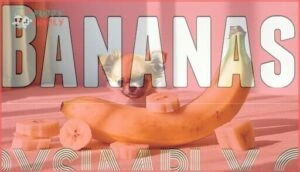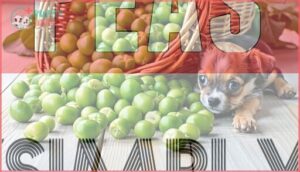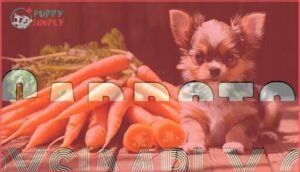This site is supported by our readers. We may earn a commission, at no cost to you, if you purchase through links.

Safe options include apples (seedless), blueberries, carrots, cooked chicken, and plain rice. However, grapes, chocolate, onions, and avocado are absolutely off-limits and can cause severe poisoning.
Due to their fast metabolism and small stomachs, portion control matters more than with larger breeds. Always remove seeds, pits, and cores before sharing human foods, and introduce new items gradually.
Smart food choices can strengthen your bond while keeping vet bills at bay—but there’s more to master about portions and preparation methods.
Table Of Contents
- Key Takeaways
- Chihuahua Food Basics
- Fruits for Chihuahuas
- Vegetables for Chihuahuas
- Dangerous Foods for Chihuahuas
- Safe Human Foods
- Frequently Asked Questions (FAQs)
- What foods are bad for Chihuahuas?
- Can Chihuahuas eat any dog food?
- What is the leading cause of death in Chihuahuas?
- What are Chihuahuas not supposed to eat?
- What is toxic to Chihuahuas?
- What is the best food to give a Chihuahua?
- Should Chihuahuas have wet or dry food?
- Can chihuahuas eat popcorn? If yes, how should it be prepared and served?
- How many calories should my chihuahua eat daily?
- Are human multivitamins safe for chihuahuas?
- Conclusion
Key Takeaways
- Know the toxic foods that can kill your Chihuahua – chocolate, grapes, onions, and avocado are absolutely off-limits since even tiny amounts can cause organ failure or death in these small dogs.
- Practice strict portion control with all treats – your Chihuahua’s fast metabolism and small stomach mean treats shouldn’t exceed 10% of daily calories, and you’ll need to adjust serving sizes for their tiny frame.
- Prepare safe foods properly before sharing – always remove seeds, pits, and cores from fruits, skip all seasonings on meats and vegetables, and introduce new foods gradually to avoid digestive upset.
- Choose the right safe options for healthy bonding – seedless apples, blueberries, plain cooked chicken, carrots, and plain rice make excellent treats that strengthen your relationship while supporting your dog’s health.
Chihuahua Food Basics
You’ll want to know what foods keep your Chihuahua healthy and which ones could harm them.
Understanding your tiny companion’s dietary needs helps you make smart feeding choices that support their long, active life.
Healthy Treats
Your chihuahua’s tiny frame deserves premium fuel. Commercial options like grain-free biscuits and dental chews sized for small breeds offer convenience and nutritional balance.
Homemade treats using pumpkin, chicken, and oat flour let you control ingredients while avoiding harmful additives. Remember portion control—treats shouldn’t exceed 10% of daily calories.
Perfect treat timing pairs with training sessions, making healthy snacking both rewarding and educational for your petite companion. Choosing all-natural snacks helps avoid synthetic preservatives and supports a healthy diet with natural ingredients.
Toxic Foods
Several toxic foods pose serious health risks to your Chihuahua. Grapes, chocolate, onions, and avocado top the list of harmful foods that can cause toxic symptoms ranging from vomiting to organ failure.
Watch for signs like lethargy, difficulty breathing, or seizures after accidental ingestion. Poison prevention starts with keeping unsafe ingredients locked away and offering safe alternatives instead.
When food allergies develop, vet consultation guarantees proper diagnosis and treatment planning, which is crucial for preventing toxic symptoms and ensuring the overall health of your Chihuahua, including the prevention of organ failure.
Nutritional Needs
Understanding your tiny companion’s calorie requirements forms the foundation of proper chihuahua nutrition.
Adult Chihuahuas need 40-50 calories per pound daily, while puppies require 50-55 calories.
Protein sources should comprise 18-30% of their diet, with animal proteins like chicken being ideal.
Vitamin intake and mineral balance support immune function, while proper hydration needs support maximal health for your dog’s wellbeing.
Many owners are now exploring raw venison diets for their chihuahua’s health.
Fruits for Chihuahuas
Many fruits make excellent treats for your Chihuahua, but you’ll need to know which ones are safe and how to prepare them properly.
Fresh fruits can provide valuable vitamins and fiber while satisfying your tiny dog’s sweet tooth, though moderation is key due to their small size and sensitive digestive systems.
Apples
Apples make excellent healthy treats for your chihuahua when prepared correctly.
These crunchy fruits provide vitamin A, vitamin C, potassium, and fiber while supporting digestive health and freshening breath.
However, apple preparation matters substantially for your chihuahua’s safety.
- Apple Varieties: All common apple varieties are safe, but choose organic when possible to minimize pesticide exposure
- Apple Preparation: Always remove seeds and core completely, as apple seeds contain cyanide which is toxic to dogs
- Apple Portions: Limit to small slices as occasional treats, comprising no more than 10% of your chihuahua’s daily diet
These low-fat, low-calorie apple benefits make them perfect for chihuahua nutrition without contributing to weight gain.
Dogs with sensitive stomachs may experience digestive upset if overfed, so monitor your pet’s reaction when introducing apples to their chihuahua diet.
Bananas
Yes, bananas are safe foods for your Chihuahua diet when served properly.
These potassium-packed treats offer excellent banana benefits including fiber, vitamin C, and magnesium.
However, serving size matters tremendously – only small pieces prevent digestive upset.
Ripeness matters too; overly ripe bananas contain more sugar.
Remove peels completely using proper preparation methods.
Watch for rare banana allergies and avoid ingredients to avoid like added sugars in commercial banana treats, ensuring a safe and healthy Chihuahua diet.
Blueberries
Blueberries are a powerhouse treat for Chihuahuas, packed with antioxidants, vitamin C, and fiber that support immune function and cognitive health.
Fresh or unsweetened frozen varieties work perfectly, while canned options should be avoided.
These low-calorie, hydrating berries make excellent training rewards, but limit serving size to prevent digestive upset—small portions keep your tiny companion healthy and happy, which is essential for their overall cognitive health.
Cantaloupe
Occasionally, cantaloupe makes an excellent hydrating treat for Chihuahuas due to its high water content and essential nutrients.
This melon provides vitamins A, B6, and C, plus fiber and potassium that support immune and eye health.
Remove rinds and seeds completely to prevent choking and intestinal blockages.
Serve small, plain pieces as safe dog foods, limiting portion sizes to avoid digestive upset from natural sugars in this nutritious addition to your dog’s diet.
Remember that cantaloupe rind is dangerous and should never be given to dogs.
Cranberries
Plain cranberries offer your Chihuahua vitamin C, fiber, and antioxidants that support urinary tract health.
However, cranberry risks include digestive upset from overfeeding and potential toxicity from sweetened varieties.
When serving cranberries, choose fresh or unsweetened dried options, avoiding raisins or added sugars, to ensure they remain a safe and healthy option.
Small portions work best for Chihuahua nutrition, making cranberries suitable dog treats when prepared properly.
Vegetables for Chihuahuas
You’ll want to know which vegetables are safe for your tiny companion before sharing your dinner plate.
While many vegetables offer excellent nutritional benefits for Chihuahuas, others can pose serious health risks that every pet owner should understand.
Peas
Through the lens of pea nutrition, these tiny green powerhouses pack a punch for your Chihuahua’s health.
Frozen peas make convenient treats, while fresh varieties require minimal pea preparation—simply steam and cool.
Rich in vitamins A, B, and K, peas support safe dog ingredients in your Chihuahua nutrition plan, and this dog diet addition promotes digestive health while avoiding harmful dog ingredients.
Monitor for pea allergies, though reactions are rare, making peas an excellent choice for balanced dog nutrition.
Pumpkin
Beyond peas, pumpkin serves as a superfood for your Chihuahua’s digestive health.
This nutrient-packed vegetable contains soluble fiber that naturally controls both diarrhea and constipation.
Rich in vitamins A, C, and E, pumpkin supports immunity and vision while its potassium aids metabolism.
The antioxidant beta-carotene reduces inflammation, making pumpkin an excellent addition to your Chihuahua diet as a safe dog treat with digestive health benefits.
Carrots
Carrots make fantastic safe dog treats for your Chihuahua’s diet.
Rich in beta-carotene for vision and immunity, these crunchy vegetables provide fiber for digestion and vitamins K and C.
Their low-calorie profile supports weight management.
For Chihuahua care and diet safety, chop carrots into small pieces to prevent choking.
Raw carrots may help reduce plaque buildup naturally, and are a great addition to support weight management.
Sweet Potatoes
Sweet potatoes offer your Chihuahua a powerhouse of nutrition that’s both delicious and digestible.
These orange gems provide sustained energy through complex carbohydrates while delivering essential vitamins and minerals for peak health.
- Beta-carotene boost: Supports your pup’s vision and immune system naturally
- Fiber-rich goodness: Promotes healthy digestion and regular bowel movements
- Anti-inflammatory power: Helps protect against chronic diseases with antioxidants
Sweet potatoes make excellent safe dog treats when prepared properly—simply steam or bake without seasonings.
Remember that sweet potatoes, like regular potatoes, should be cooked to avoid solanine’s toxic effects.
Start with small serving sizes to avoid digestive upset.
Consider mashing cooked sweet potato into homemade dog nutrition recipes or offering bite-sized pieces as training rewards.
This wholesome addition to your Chihuahua care routine provides valuable nutrients while avoiding harmful dog foods, making it a smart choice for responsible dog diet management.
Dangerous Foods for Chihuahuas
While you want to spoil your tiny companion, certain foods can seriously harm your Chihuahua’s health.
These dangerous items should never find their way into your pet’s bowl, as they can cause everything from digestive upset to life-threatening emergencies.
Grapes
When grapes enter your Chihuahua’s system, they trigger potentially fatal kidney failure through unknown toxic mechanisms.
Even seeded grapes or a single raisin can cause devastating organ damage in these tiny dogs.
Grape toxicity requires immediate veterinary intervention, making proper Chihuahua food safety essential for preventing exposure to these unsafe foods.
| Grape Type | Toxicity Level | Safe Alternative |
|---|---|---|
| Fresh grapes | Extremely dangerous | Blueberries |
| Raisins/dried | Highly toxic | Apple slices |
| All varieties | No safe serving sizes | Banana pieces |
Onions
Onions pose serious onion toxicity risks to Chihuahuas, containing N-propyl disulfide that destroys red blood cells.
All allium species—including garlic, chives, and leeks—are harmful foods for dog health.
Cooking onions doesn’t eliminate toxicity; even small amounts in table scraps cause hemolytic anemia.
Safe amounts don’t exist for Chihuahuas.
Use onion alternatives like dog-safe seasonings for Chihuahua food safety instead.
Chocolate
Chocolate poses serious chocolate toxicity risks for your Chihuahua.
Even small amounts of baking chocolate, cocoa powder, or dark chocolate can cause vomiting, seizures, and death.
Their tiny size makes any chocolate consumption dangerous.
Skip harmful dog treats containing chocolate entirely.
Instead, choose safe alternatives like plain dog biscuits for dog food safety and proper dog nutrition safety.
Avocado
Avocado toxicity presents serious risks for chihuahuas through persin, a compound concentrated in skin, pit, and leaves.
Persin in avocado skin, pit, and leaves can cause fatal heart complications in tiny Chihuahuas.
This toxin causes vomiting, diarrhea, and potentially fatal heart complications in small dogs.
- Persin damages heart muscle tissue, causing fluid buildup
- Even small amounts trigger stomach upset in tiny breeds
- Guacamole and avocado-containing foods pose equal dangers
- Symptoms include breathing difficulty and irregular heartbeat
Skip avocado entirely—your chihuahua’s safety isn’t worth the risk, due to the potential for fatal heart complications.
Safe Human Foods
You’ll be happy to know there are plenty of human foods that can safely supplement your Chihuahua’s diet when given in moderation.
These protein-rich and nutritious options can serve as healthy treats or meal additions, but they should never replace your dog’s balanced commercial food.
Cooked Chicken
Properly prepared chicken serves as your chihuahua’s protein powerhouse when you follow essential chicken preparation guidelines.
Remove all skin, fat, and bones to prevent choking hazards and digestive upset. Skip safe seasonings entirely—plain, thoroughly cooked chicken works best.
Cooked chicken provides essential health benefits and is a key part of proper chihuahua nutrition.
Monitor portion sizes carefully, as even safe pet ingredients can cause stomach issues when overfed. Watch for allergy risks, since chicken ranks among common canine allergens requiring veterinary advice for proper nutrition safety.
Plain Yogurt
Plain yogurt serves as an excellent probiotic powerhouse for your Chihuahua, supporting digestive health through beneficial bacteria.
Plain yogurt transforms tiny tummies into healthy, happy powerhouses through beneficial bacteria.
Choose unsweetened Greek varieties for maximum protein content while avoiding harmful pet ingredients like xylitol. Since lactose content varies among dogs, introduce small serving sizes gradually to assess tolerance.
These yogurt benefits make it a smart addition to your Chihuahua diet safety plan, but skip flavored yogurts entirely—they contain unsafe additives that contradict safe pet ingredients guidelines for proper Chihuahua nutrition safety.
Some owners explore dairy-free options, but cashew yogurt requires approval from a veterinarian.
Cooked Rice
When cooked properly, white rice becomes a gentle, easily digestible carbohydrate source that’s perfect for your Chihuahua’s sensitive stomach.
This simple grain offers excellent rice nutrition through clean energy, making it a go-to ingredient in many safe canine foods.
Veterinarians often recommend plain, boiled rice paired with lean protein for digestive upset, as proper preparation methods guarantee maximal Chihuahua diet safety.
You can find more about cooked rice benefits on various websites.
Always serve plain rice without seasonings, maintaining appropriate serving sizes for your tiny companion’s nutritional needs.
Green Beans
Green beans offer your chihuahua a nutritious, low-calorie snack that’s packed with vitamins A, C, and K plus essential minerals.
You can serve them raw, steamed, or boiled, but avoid canned varieties with added salt.
Chop beans into small pieces to prevent choking, and introduce them gradually into your puppy’s feeding guide or senior diet to monitor for allergies.
Frequently Asked Questions (FAQs)
What foods are bad for Chihuahuas?
Since Tommy’s Chihuahua gobbled up chocolate chips last month, you’ll want to avoid chocolate, grapes, onions, garlic, xylitol, macadamia nuts, and avocados.
These toxic foods can cause anything from blood cell damage to liver failure in your tiny companion.
Can Chihuahuas eat any dog food?
You can feed Chihuahuas most high-quality dog foods designed for small breeds.
But you’ll want to choose options with smaller kibble sizes that match their tiny mouths and avoid foods with harmful ingredients.
What is the leading cause of death in Chihuahuas?
Like a ticking clock marking life’s precious moments, congestive heart failure represents one in five Chihuahua deaths.
You’ll find this cardiac condition particularly affects older dogs through chronic degenerative mitral valve disease.
Early detection helps.
What are Chihuahuas not supposed to eat?
Don’t feed your Chihuahua chocolate, grapes, onions, garlic, avocado, or xylitol-sweetened products. These foods can cause serious poisoning, kidney damage, or even death in small dogs like yours.
What is toxic to Chihuahuas?
Chocolate, xylitol, grapes, raisins, onions, garlic, avocado, coffee, alcohol, and macadamia nuts are extremely toxic to your Chihuahua.
Even small amounts can cause serious poisoning, organ failure, or death in these tiny dogs.
What is the best food to give a Chihuahua?
Premium dog food specifically formulated for small breeds’ll fuel your tiny companion like rocket fuel!
Choose high-quality kibble with real meat as the first ingredient, smaller kibble size for easier chewing, and balanced nutrition suited to their lightning-fast metabolism.
Should Chihuahuas have wet or dry food?
Both wet and dry food work well for Chihuahuas, but dry kibble helps maintain dental health by reducing plaque buildup.
You can mix both types or choose based on your dog’s preferences and specific health needs.
Can chihuahuas eat popcorn? If yes, how should it be prepared and served?
Plain popcorn’s generally safe for your Chihuahua, but you’ll need to skip butter, salt, and seasonings. Air-pop kernels, remove unpopped pieces, and serve small portions as occasional treats only.
How many calories should my chihuahua eat daily?
Your chihuahua needs 20-30 calories per pound of body weight daily. A typical 6-pound chihuahua requires roughly 120-180 calories, while smaller 3-pound dogs need about 60-90 calories daily.
Are human multivitamins safe for chihuahuas?
Never give human multivitamins to your chihuahua – they’re formulated for our bodies, not theirs.
These supplements can cause dangerous toxicity, especially from iron and xylitol.
Consult your vet for dog-specific vitamins instead.
Conclusion
Statistics reveal that 75% of pet poisoning cases involve dogs consuming foods perfectly safe for humans.
Following the ultimate guide to what chihuahuas can and can’t eat protects your tiny companion from serious health risks.
Remember that your Chihuahua’s small size makes portion control critical—even safe foods become dangerous in large quantities.
Always introduce new foods gradually and remove seeds, pits, or cores before sharing, to ensure you’re providing healthy treats while avoiding emergency vet visits.
With proper knowledge and careful preparation, you’ll confidently provide a safe diet and avoid emergency vet visits.
- https://a-z-animals.com/blog/what-do-chihuahuas-eat-their-diet-explained/
- https://www.reddit.com/r/Chihuahua/comments/16y2ptx/what_do_you_all_feed_your_chis/
- https://www.carecredit.com/well-u/pet-care/healthy-food-for-dogs/
- https://iheartdogs.com/ideal-diet-for-chihuahuas-the-ultimate-chihuahua-feeding-guide/
- https://www.aspca.org/pet-care/aspca-poison-control/people-foods-avoid-feeding-your-pets

















